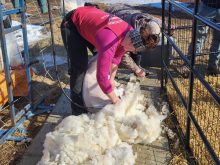BALZAC, Alta. – Dale Clark and Randy Kaiser figure they’ve found the solution to raising cattle in a drought.
Since the Alberta men made the switch to Welsh Blacks, they’ve discovered the sturdy British cattle eat less and wean big calves even under adverse conditions.
The cattle have been in Canada since 1970.
“The drought showed many they have to go back to basics,” said Kaiser.
He and his wife Paulette have a fullblood herd of about 160 black cows at Crossfield, north of Calgary.
Read Also

Charges laid after cattle theft
Saskatchewan RCMP lay two charges against a man after six cattle went missing.
“Drought tolerance is due to the fact the cows are easy fleshing. They have a lot of rib.”
This winter his cows are eating straw and four and a half pounds of pellets. This summer with pastures in short supply, their cows came through in healthy condition.
Dale Clark bought his first Welsh Blacks in 1995 but elected for the red strain.
He started with a dozen cows and a prize bull. He had tried other breeds but found this moderately sized cow was easier to keep and more docile than other breeds. He plans to have a herd of 28 purebred polled cows this year.
Clark likes their feeding efficiency as well as the breeding results when he crosses Red Welsh bulls with Hereford, Angus, Limousin or Simmental cows.
His star female is a Simmental-Hereford cow that he breeds to a Red Welsh bull.
“Her calves are probably the best,” he said.
The Kaiser herd was established in 1991.
“We had commercial Angus cows and these crossed with just about everything. We decided it was time to go the purebred route.”
Their herd is almost entirely fullblood, meaning the animals are direct descendants of Welsh cattle rather than breeding up with other breeds to achieve purebred status.
Canadian breeders regularly import new genetics via semen and embryos from Wales.
This spring, Kaiser and other Welsh breeders plan to send 40 bulls to Olds College to participate in a 140-day bull feeding efficiency trial.
“For 20 years we were testing for average daily gain but we now are getting into something we really believe is important and that’s net feed efficiency,” said Kaiser.
Tests results are hard to compare across breeds but Welsh Black producers hope science will confirm what they believe to be true among their cattle. They feel the breed converts feed more efficiently, making better gains on less feed than the average.
The moderate-sized bulls produce low birth weight calves, making them useful for heifers. In addition, the Welsh cow appears to have a wider than average pelvic opening so calving problems are minimal.
Welsh cattle descended from herds roaming in the hills and mountains of Wales in pre-Roman times. Shorter-legged than continental breeds, they are deep-bodied and carry a heavy hair coat in winter.
They are closely related to the Angus but are smaller, with cows weighing from 1,100 to 1,400 pounds. They don’t carry much backfat but marble well.
The Canadian Welsh Black Cattle Society registers purebreds and fullbloods with Canadian Livestock Records in Ottawa. There are probably fewer than 1,000 in the country being raised by about 30 breeders.

















